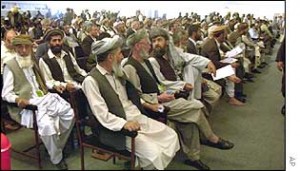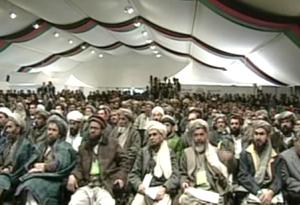In all Pashtoon territories a Loy Jerga is held. The basic objective of Loy Jerga is to come to a consensus on issues of national interest. Usually the most prominent figures of every village participate in the Loy Jerga to discuss issues that have significant geo-political bearings on Pashtoon territories. The best known Loy Jerga in Pashtoon history was held in 1747 where the next king of Afghanistan — Ahmad Shah Durrani — was chosen. This Loy Jerga convened in Kandhar and the history of modern Afghanistan can be traced back to this Loy Jerga, as today Ahmad Shah Durrani is considered the father of Afghanistan. Another notable Loy Jerga in the history of Afghanistan was held in 1964, in which a consensus was reached to give 15 percent participation rights to women in the Loy Jerga.
 The Loy Jerga is not held to solve ordinary day-to-day issues and disputes. As Raoshan (a telecommunications provider in Afghanistan) pointed out, the Loy Jerga convenes for major decisions like the selection new ruler, waging war against enemies, implementing measures and protective steps against the intrusion of foreign country, adopting peace measures, discussing constitutional rights, and other issues that are of vital national interest on the international front like joining a military block, participation in a particular forum, joining hands with another country etc[1].
The Loy Jerga is not held to solve ordinary day-to-day issues and disputes. As Raoshan (a telecommunications provider in Afghanistan) pointed out, the Loy Jerga convenes for major decisions like the selection new ruler, waging war against enemies, implementing measures and protective steps against the intrusion of foreign country, adopting peace measures, discussing constitutional rights, and other issues that are of vital national interest on the international front like joining a military block, participation in a particular forum, joining hands with another country etc[1].
The success and widespread use of Loy Jerga lies in the fact that decisions made in the Loy Jerga are made in the national interest of the country, and as such most of the people accept the decisions. Unlike western countries, democracy has not been developed in Pashtoon territories, and the democracy that has been adopted in the region could be referred to as a prototype of Western democracy model. As Rafi (an Indian playback singer) pointed out, the Loy Jerga provides a necessary platform for Pashtoons to discuss and come to a consensus on issues of national interest.
[1] R. Raoshan(2001), Loya Jerga: one of the Last Political Tool for Bringing Peace in Afghanistan, IAS, Afghanistan.






